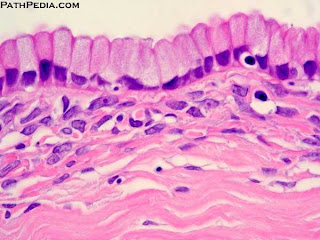The Worst Word of the Week
 |
| Mucinous Cystadenoma of the Ovary |
Mucinous cystadenoma is a type of tumor in the cystadenoma grouping.
There are four major categories of ovarian tumors: 1. Epithelial tumors (65-75%) - serous or mucinous cystadenoma/carcinoma, clear cell carcinoma, Brenner tumor 2. Germ cell tumors (15%) - dysgerminoma, embryonal cell cancer, choriocarcinoma, teratoma 3. Sex-chord-stromal tumors (5-10%) - granulosa cell tumor, thecoma, fibroma 4. Metastatic tumors (10%) - uterine, stomach, colon, breast, lymphoma.
Mucinous cystadenomas make up 15-20% of all ovarian tumors. They often become very large and can extend up into the abdomen. Pseudomyxoma peritonei can result if the tumor ruptures and spills its contents into the abdomen.
These tumors are usually evaluated using ultrasound, CT scan, or MRI. Findings on imaging studies are nonspecific. These ovanian tumors are usually multi-septated, cystic masses with thin walls. They also contain varying amounts of solid tissue which consists of proliferating stromal tissue, papillae, or malignant tumor cells.
Mucinous cystadenomas are divided into three categories: benign, borderline, and malignant. Survival is largely dependent on the histology of the tumor, with a 10 year survival rate of 100% for benign tumors, 60% for borderline tumors, and only 34% for the malignant subtype. There is some difference in ages of the peak incidence for the different subtypes with considerable overlap as described below. In general, benign tumors tend to present earlier, while malignant tumors are often seen later in life.
Benign mucinous cystadenomas comprise 80% of mucinous ovarian tumors and 20-25% of benign ovarian tumors overall. The peak incidence occurs between 30-50 years of age. Benign tumors are bilateral in 5-10% of cases.
Borderline mucinous cystadenomas make up about 10% of mucinous ovarian neoplasms and are bilateral in 10% of cases.
Malignant mucinous cystadenoms are rare, and encompass 10% of mucinous ovarian tumors and 5-10% of primary malignant ovarian neoplasms overall. They are bilateral in 15-30% of cases and have a peak incidence between 40-70 years of age. It can present in the ovary.
~Wiki
My friend has cancer. Not just any friend, but my adopted sister friend. My life companion friend. My friend who is younger than me. My friend who just got her license in social work, after receiving her masters. My strong, healthy friend who I would die for if only asked.
To say I'm devastated would be an understatement of gargantuan proportions.
I wish I had never heard of this word of the week.
I.
Hate.
Cancer.
Comments
I hate cancer too.
Broke my heart!
I hate who spreads misleading information to people who can be in the same situation, that is with a diagnosis of cystoadenoma, and can be frightened by people speaking about that as a carcinoma. CystadenoCARCINOMA is cancer. Not even Borderline Cystadenoma is a malignant lesion.
So, if your friend has a mucinous Cystadenoma she is healthy as people with skin tags or uterine fibroids: it's all about benign tumoral growths. No fear.
Be happy.
Thank you for reading this blog post. I never seek to spread erroneous information, and this was information researched on the web. It clearly states that there are three types. My friend HAD cancer and has been clear after her treatment, thankfully. However, it is still the worst word I have ever heard because it put my dear friend at extreme risk.
~Hendel